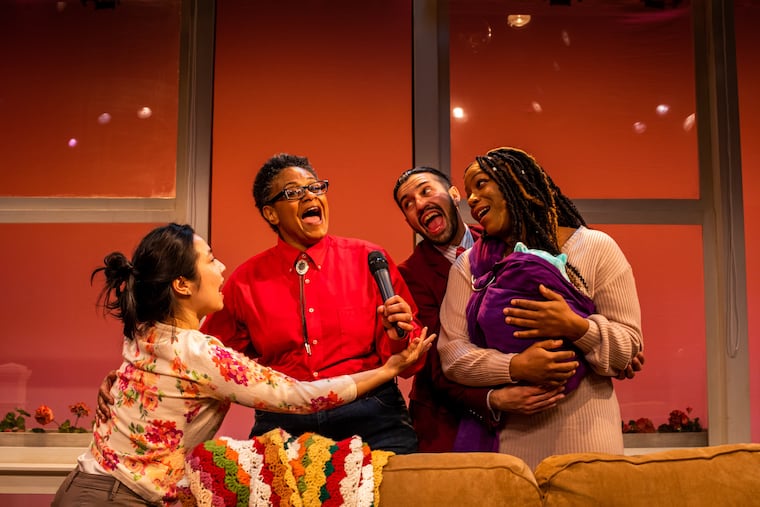Review: ‘Backing Track’ offers humor and poignant reflections on love, grief and the challenges of community
The show’s wit pays tribute to Abbott and Costello, but also derives from character and, often, the interface between human beings and technology.

The Arden Theatre Company’s world-premiere production of Backing Track, a play about technology, loss, and gentrification, offers abundant pleasures. Playwright R. Eric Thomas has serious comedic talent, the male lead is a magnetic performer with a glorious voice, and Rebecca Wright’s precise direction allows the entire six-person ensemble to shine.
The show’s wit pays tribute to Abbott and Costello, but also derives from character and, often, the interface between human beings and technology. The humor is bracketed by karaoke numbers and, eventually, poignant reflections on love, grief, and the challenges of community.
It just takes too long to get there. At more than two and a half hours, including intermission, Backing Track could benefit from pruning, even if it sacrifices some laughs and music along the way.
In program notes, Thomas, a Barrymore Award-winning playwright and television writer, says the show can be viewed as “a karaoke-infused cabaret, a memory play, a call to a late-night radio show requesting that song that will change everything.” Or, he writes, it may simply be “a mixtape brought to life on stage.”
That theme is picked up by projection designer Taj Rauch, who depicts the spinning of vinyl records and lists scene titles as tracks.
The play is set “in 2018 or thereabouts,” primarily in the home that Avery (Brenson Thomas, no relation to the playwright) shares with his widowed mother, Mel (Melanye Finister, the show’s emotional anchor). Mel is grieving, hard, the loss of her wife, Miriam. She refuses to remove plastic sheeting from her windows (a Miriam quirk) and keeps rerunning James Cameron’s 1997 film Titanic (a Miriam favorite, whose themes happen to be love and loss).
Mel is eager to hand off the house, and its responsibilities, to Avery, who resists. He diverts himself by singing karaoke on cruise ships, driving Miriam’s old car for Lyft, and perusing the dating app Grindr. His pregnant sister, Jessica (Danielle Leneé), is visiting from Canada with her husband, René (Joseph Ahmed), who has installed solar panels in Mel’s yard.
The panels’ unsightliness prompts a visit from two neighbors, Esther (Bi Jean Ngo), a gift-bearing former friend of Miriam’s, and Abraham (Carl Hsu), who is running Airbnbs in their diversely populated, fast-changing neighborhood. (The playwright, a former South Philadelphia resident, lives in Baltimore, but the neighborhood in the play is unidentified.)
Act I (or Side A, as Thomas calls it) is stronger on exposition than plot. Act II (Side B) offers more hilarity and, finally, an emotional payoff or two. But Thomas’ greatest gift is for comedy. His take on technology – from voice-operated smart home devices to dating apps – is quirky and original. Especially clever is a scene in which Mel’s answers to computer security questions trigger memories and backstory. (“Who was your favorite childhood friend?” Avery asks her. “I didn’t have any friends! …I was a very lonely child,” Mel responds.)
Chris Haig’s mostly realistic scenic design, lit by Natalie Robin, includes a karaoke bar, described by the script as “suspended in time.” It’s often unclear whether Avery is in the house or on a ship at sea. Other characters wander in unexpectedly, and their incursions are explained as psychological. Those scenes could be cut. So, too, could some portion of Avery’s extended Grindr courtship — and even a handful of his gorgeously sung karaoke numbers.
“Backing Track,” presented by the Arden Theatre Company on the Arcadia Stage, 40 N. 2d St., through April 10. Tickets: $18-$53. Masks and either proof of vaccination or recent negative COVID-19 test required. Information: www.ardentheatre.org or 215-922-1122.